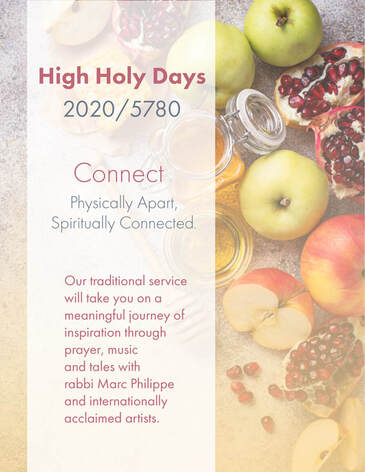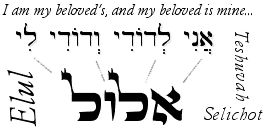High Holy Days
Preparation
In the old country, when the plums were ripe and the pears were ready to be eaten, the Jews knew it was the time of the Hebrew month of Elul, the month preceding the High Holy Days. That season was called the time of the “Flaumen und die Beren”, the time of the plums and pears. In Yiddish however, these two words have another meaning. “Flaumen” means “flames”, and “Beren” means “to burn”. The Jews knew it was the time to serve God with a flame and with a burning desire.
The four letters that form the word “Elul” (aleph-lamed-vav-lamed) are an acrostic for the verse “Ani ledodi vedodi li”, meaning “I am to my beloved and my beloved is mine” (Song of Songs 6:3). The interpretation of this verse is that the “beloved” refers to God. So the sages use this acrostic to describe the particularly loving and close relationship between God and Israel. Elul, then, is our time to establish this closeness.
Traditionally, the Jewish month of Elul is also a time for personal reflection and spiritual preparation for the New Year. This introspection offers the opportunity to examine what is holding us back from being who we really want to be.
Below are some of the Jewish traditions for this period, followed by suggestions in order to enhance your High Holy Days experience. These are only suggestions, you may do as many or as little as you feel. Perhaps, even just reading them will bring a different awareness to your Yamim Noraim (Days of Awe).
Tradition The time before Rosh Hashanah and the ten days between Rosh Hashanah and Yom Kippur is a time of introspection.
Suggestion Make some time for yourself regularly. Take a twenty minute meditative walk breathing in beautiful Divine, healing energy while breathing out negative thoughts, purging your body of all negativity.
Tradition As mentioned above, the word “Elul” can be understood as an acronym for the Hebrew verse, “Ani Ledodi, Vedodi Li”, “I am to my beloved, and my beloved is mine”.
Suggestion Think of your relationship with your concept of the Divine Presence. How can you make this relationship more intimate, knowing that you are God’s beloved? Remember also that you are created in God’s image. Honor the Divine within you while acknowledging the Divine in all human beings.
Tradition Teshuva (repentance): Our liturgy teaches that three things will change a negative decree: Teshuva, Tefilla, Tzedaka.
Teshuvah is to recognize that we may have missed the mark once in a while.
It is also the time to say “I’m sorry” on two levels. The first involves our relationship with God, and the second involves our relationship with human relationships.
Suggestion 1) To miss the mark is human. Recognizing mistakes and deciding to do something about it is being a Mentsch.
2) Make that phone call that has been delayed.
3) To say “I’m sorry” is crucial, but to forgive is a Divine attribute.
Tradition Tefilla (prayer): As mentioned above, this is the time to serve God with flame and with a burning desire.
Suggestion 1) Choose one prayer and study it carefully. Try to understand each word. Take it to another level and whenever you say it, infuse it with extra intention.
2) Use the time during the High Holy Days to open your heart to God. You can create your own space by closing your eyes and imagine you are telling a good friend everything that makes you happy and everything that hurts you. Know that this good friend listens to you, cares for you and will do everything for you.
Tradition Tzedakah: Charity is the third endeavor that will help us being inscribed in the Book of Life for a good year.
Suggestion Invite your family members to care for a cause and to volunteer time and money for that cause. Remember also your synagogue. Your donation of time and money goes a long way by providing spirituality, comfort, educational opportunities and outreach to the community.
Tradition The shofar is sounded at the conclusion of every morning Service during the Hebrew month of Elul. It is also sounded during the Rosh Hashanah Services and at the conclusion of Yom Kippur.
Suggestion If you don’t have the chance to hear the shofar each day, a recording of the shofar blowing is available on our website: tesobe.org. We invite you to listen to it, and feel connected and proud of our 3,500 year old tradition. Think of all the generations who handed us our beautiful tradition.
Tradition Psalm 27, which begins with the words “God is my light and my helper, whom shall I fear?” is recited from the beginning of month of Elul till Sukkot.
Suggestion A poetic interpretation of Psalm 27 by Rabbi Patti Haskell.
Good morning, God, happy Elul.
This day, one thing do I ask of you, God,
One thing do I seek:
To dwell in your house
All the days of my life.
… and while I dwell with you
Perhaps a few more things I might request:
Good health is at the top of my list--
For me, my family, my loved ones,
While we’re at it how about everyone, everywhere.
And perhaps food:
A healthy nosh for all who are hungry.
Quench all hunger and thirst with your love.
We do hunger for more than food and drink, so
Please quench other needs as well.
Okay, how ‘bout safety.
Safety from earthquakes, hurricanes,
Safety from one another.
Safety from all that frightens us
Safety to rest in your care.
And laughter.
Please give us much fun, silliness
to giggle at, many many smiles.
Smiles as we watch children investigate their worlds,
Smiles as we explore the lives of our elders.
God, let me behold your graciousness
Today… each day of Elul… each day
Of this year, and next, and then the next,
While I visit your temple
And immerse in your love.

